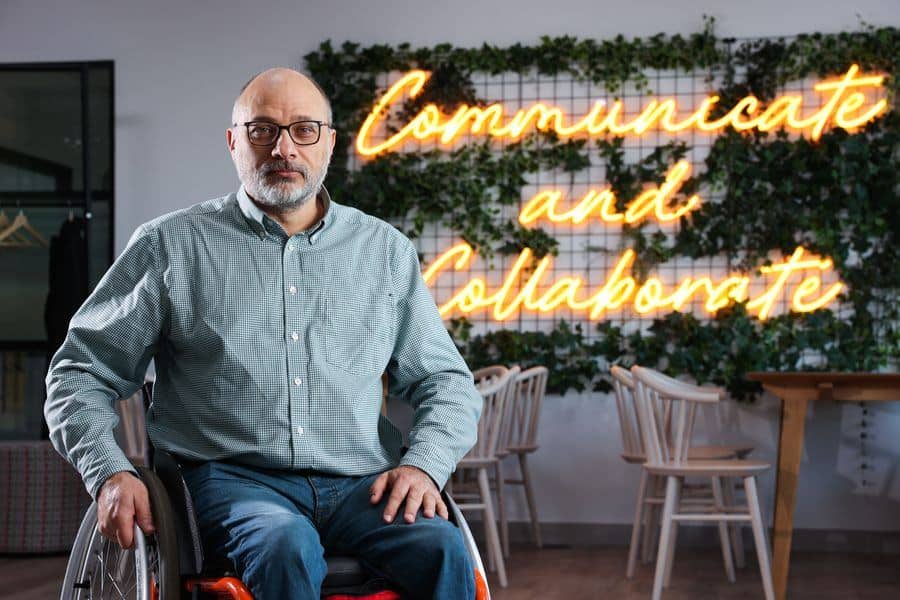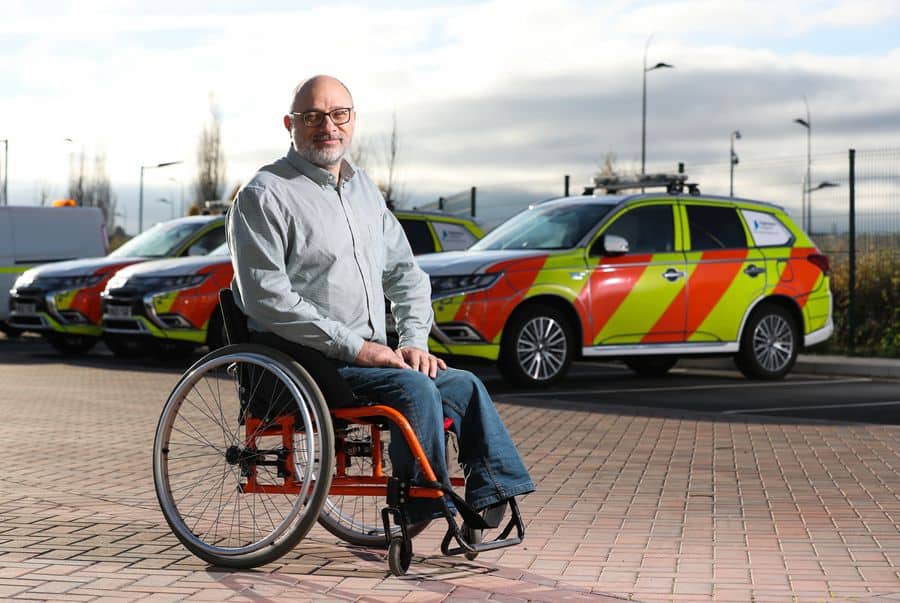Guest Article: How National Highways plans to provide a better service for disabled road users

With car travel remaining the most popular form of transport among disabled adults, National Highways’ Equality Diversity and Inclusion Manager, Julian Horsler explores how the organisation is working to meet the needs of disabled people on England’s roads.
By Julian Horsler
Disabled drivers account for five per cent of the driving population in the UK. In 2020, 2.44 million road users held blue badges, a 6.5 per cent increase on 2019.
The numbers highlight that car travel is not only a preference for disabled adults, but a growing trend. For many disabled people, our roads provide the best travel options for them, enabling them to travel to work, go on holiday, or visit family and friends. However, sometimes it isn’t the obvious barriers that prevent people from travelling independently, it can be the hidden or unknown ones that cause the most difficulties.
For example, the anxiety associated with breaking down on a high-speed road can be a barrier to travelling alone. Or the fear of stopping for a break somewhere with poor access can be a barrier to taking a trip in the first place.
A range of needs
At National Highways, we directly support thousands of road users and millions of journeys every day. This includes providing information and advice to help people feel more confident when they travel, and continually improving how our roads are planned, built and operated. Our focus is on delivering quality, accessible and inclusive support that goes beyond the day-to-day.
It’s vital that we’re listening to the differing needs of individuals so that the feelings and experiences of those affected by our work shape the things we do. There’s no ‘one size fits all’ solution. So, our challenge is to identify and prioritise the options and opportunities we know will work; and make sure we can deliver these across our organisation in a way that will really make a difference for people.
An example of this is the new text message service we’ve introduced. If someone needs roadside assistance, and is unable to use a roadside emergency phone due to an impairment such as deafness, they can now text us to let us know they need help. It sounds simple, but it’s a huge undertaking for an organisation the size of National Highways to mobilise safely and roll out on a large scale.
The logistical challenges mean that we need to have a really good understanding of what the right things to do are, and when to do them. And it’s through close and meaningful engagement with disabled road users that we’re learning how we can help.
Working with the experts
Collaboration and partnerships have proved the greatest success when creating change. Such as our partnership with Hidden Disabilities Sunflower.
Aiming to provide people with non-visible disabilities better support if they breakdown, our two organisations teamed up to launch a free Hidden Disabilities Sunflower for vehicles in September 2021.
The idea was proposed by one of our traffic officers, after attending an awareness course run by Driving Mobility UK, and was backed by feedback from our disabled customers.
The initiative works in a similar way to the globally-recognised Hidden Disabilities Sunflower lanyard – where those with non-visible disabilities can wear a Sunflower lanyard in public spaces to discreetly indicate that they may need additional help or support. People can now also order a free Sunflower sticker or magnet to display on the back of their vehicle.
National Highways frontline services, including our traffic officers and customer service teams, are trained to recognise the Sunflower, understand its meaning and respond to help keep the person safe and provide the appropriate care.
We’ve sent out over 7,000 Sunflowers so far, and customer feedback has shown that it’s already breaking down barriers – giving those with non-visible disabilities more confidence on our roads.
Mark Charlesworth, Sunflower wearer, commented: “You need that freedom just to be able to go in a car and off you go. If a bird needs to fly, they fly. And people with hidden disabilities, we can’t fly as easy, and we just need that freedom to be able to lift us as high as we can go.”
The whole is greater than the sum of its parts
Initiatives like our partnership with Hidden Disabilities Sunflower are only possible through the coming together of organisations with shared interests, each bringing something of value to the project.
That’s why National Highways established the Roads for All Forum in 2018. The Forum brings together a wide network of those providing services to disabled road users, including Motability and the RAC, alongside charities and representative groups such as Disability Rights UK, Autistica and the British Deaf Association.
Since its launch, the Roads for All Forum has set in motion a range of projects to improve accessibility and inclusivity for disabled road users. These include detailed access guides for all 114 motorway services in England. Created by National Highways and AccessAble, the guides cover all aspects of accessibility at motorway services; from toilets, physical layout and contrast colours, to lighting levels and staff training.
Staffordshire-based disability advocate, Lucy Woods described the access guides as “an absolute game changer for disabled road users”, empowering disabled people to “go off and have adventures.”
Other examples include our work with the British Deaf Association to improve our services for the Deaf community, including provision of our breakdown advice in a British Sign Language video.
Robin Ash, Access and Inclusion Officer, British Deaf Association commented: “We’re working with National Highways to provide the Deaf community the same opportunities as hearing people. That is a huge achievement, and National Highways is the first organisation to achieve this. Now there is more awareness about ensuring that Deaf people have the same access to safety messages as hearing people.”
What next?
Building on our work to date, we hope to not only improve the accessibility and inclusivity of road travel, but experiences on our network for all. Excellent customer service to us means making sure that everyone using our roads feels confident that they’ll have a safe and reliable journey.
From listening to our customers, we know this means getting the basics right; from providing accurate and timely information to making sure our roads are well-maintained and running smoothly. It also means we need to keep innovating, coming up with new and better ways to make a difference for our customers as their needs and expectations evolve.
Looking ahead, we aim to grow the Roads for All Forum and deliver more projects; encouraging organisations and road users to get involved and help us to continue making the right investment decisions for our customers.



